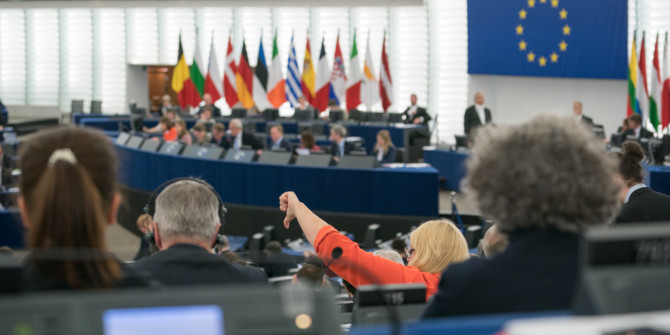Public shaming has become increasingly common in European politics. But what impact does this approach have on policymaking? Drawing on a new study, Rosa Sanchez Salgado argues that while shaming can be used as a tool for social justice, it also risks distorting the policy process.
In December 2022, European Commissioner Ylva Johansson said to anyone accepting money as part of the Qatargate scandal: “Shame on you. Shame on you for violating trust.”
While this form of public shaming is often associated with NGOs, little is known about how European policymakers use the approach. In a recent study, I assess how shaming is employed by European policymakers. I also examine whether shaming attempts have served to defend and promote EU values and democratic principles, or whether they are just part of a blame game to pursue strategic interests.
A tool for social justice?
Shame, understood as an intense painful sensation resulting from a negative evaluation of the self, is often perceived to be a tool for social justice. Shaming is mobilised to ensure compliance with international norms such as human rights and peace. The logic behind mobilising shame is that if shaming events become known, the world reacts. Exposing the gaps between moral norms and actions can in this way be used to change behaviour.
In European politics, the connection between morality and emotions is particularly prevalent in relation to foreign policy. The EU has often been shamed for its failure to act in conflict situations including in Zaire, the Middle East and the former Yugoslavia. Yet while shaming strategies place significant moral pressure on politicians about what should be done, material interests often prevail. There are many ways in which moral shaming goes wrong. Notably, shaming attempts are risky because they can lead to a backlash against the shamer.
During the 1990s, for instance, MEPs expressed a moral concern about EU subsidies for growing tobacco, arguing that smoking claims hundreds of thousands of lives per year. However, this approach was turned around by one MEP from the Union for Europe of the Nations group, who questioned why we should be concerned at this issue when the EU had not shown the same concern with fighting fraud. This is indicative of the way in which appeals to shame can rebound, in this case from the shame of funding tobacco to the shame of financial misconduct.
Even in cases where politicians agree there is a shameful situation, shaming attempts may not succeed due to adverse circumstances. For example, since the mid-1990s, the European Court of Auditors has frequently found errors in payments associated with the EU budget. While politicians have generally agreed that these errors reflected real problems, little was done about it for more than ten years. One reason for this is that the work of the European Court of Auditors lacks visibility, with shameful conclusions tending to be expressed in technical language that reduces their impact.
However, there are circumstances where appeals to shame are more likely to be successful. These included cases where there is a circumscribed problem, where there is institutional capacity to act and where there is consensus on who is to blame and broad support for action.
One successful example of public shaming is opposition in 2011 to the suspension of the EU’s Food for Free programme by a minority of member states in the Council of the European Union. MEPs were largely united in their opposition to the decision, to the extent that ensuring food for the disadvantaged was presented as a key value of the EU. A similar pattern emerged in 1996 when MEPs opposed the cancellation of the EU’s anti-poverty programme.
In both cases, shame was directed at a small number of EU member states that opposed these programmes. Under these circumstances, shame proved to be a powerful tool for social justice. However, these cases also serve as examples of disputes over the distribution of power between the EU’s institutions and the member states being reframed as moral issues. From this perspective, shaming cannot only be understood as a tool for achieving moral justice but can also be seen as a method for politicians to pursue their policy preferences.
Politics as usual?
As a political strategy, shaming can produce multiple policy benefits. These include shaping the political agenda, helping to defeat or modify policy alternatives during the adoption of policies or altering the course of policy implementation. In this sense, it might be viewed as politics as usual.
Shaming is often not dictated by moral principles or values, but rather by a sense of loyalty to an ideological or national group. In this sense, shaming can distort the policy process, for example when politicians portray compromise as a betrayal of principle, or when they repeal or undermine the implementation of initiatives enacted by opposing parties. Shaming is frequently aimed at pursuing strategic interests, but it may also be an attempt to avoid blame, reward allies or punish foes.
It should come as no surprise that different political parties or groups engage in shaming in relation to topics that are relevant in their ideological programmes. When shaming is used to support ideologically driven goals, backlashes are likely. Debates in the European Parliament over the EU’s Working Time Directive offer a good example of these dynamics.
In this case, MEPs on the left and centre-left presented their preferences as a question of human rights and human dignity, humanising workers and rejecting what they portrayed as slavery. MEPs from the European People’s Party group, in contrast, emphasised the importance of individual freedom. They also used humanising speech, focusing on families and children by arguing, for example, that working a few more hours could help some families pay an extra bill or send their children on a school trip.
The example of the European Court of Auditors also illustrates that politicians tend to use shaming to harm their political enemies, while they are extremely lenient with their allies. When responding to errors in the EU budget, pro-EU MEPs have often directed blame towards the member states, since most of these errors have related to budget items administered by national governments. At the national level, in contrast, member states have expressed distrust of the European Court of Auditors and accused it of acting as a political entrepreneur.
Meanwhile, populist groups and Eurosceptics have attempted to shame the European Commission and the EU more broadly for failing to implement essential controls, wasting public money and neglecting the real needs of ordinary people. These examples show that shaming and backlashes often give way to a blame game in which politicians try to persuade the audience to side with their positions.
All of this serves to illustrate that in politics, shaming must be approached as a double-edged sword. It can serve as a tool for social justice, but when used strategically, it can distort the policy process. More worryingly, shaming can also be used by powerful actors as a mechanism for oppression and to perpetuate injustice. This type of shaming is particularly concerning given it often remains hidden from the view of academics and wider society.
For more information, see the author’s accompanying paper in Policy Sciences
Note: This article gives the views of the author, not the position of EUROPP – European Politics and Policy or the London School of Economics. Featured image credit: Tomas Urbelionis on Shutterstock




